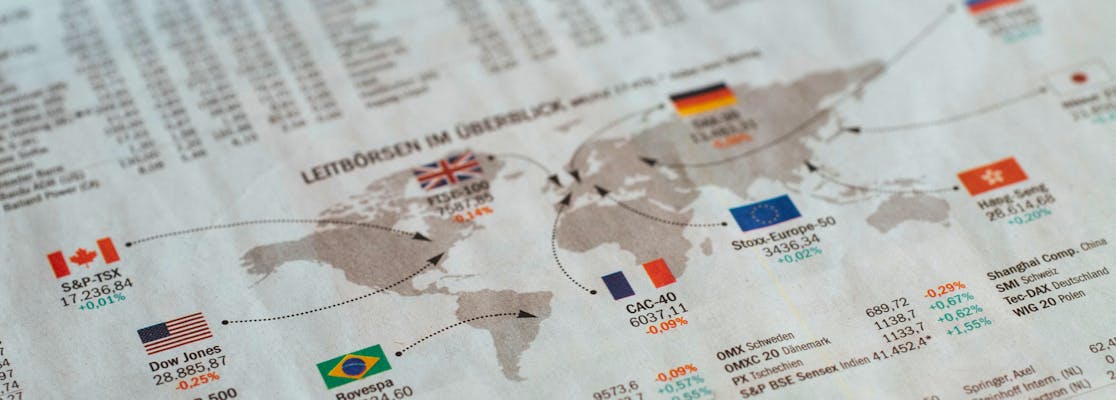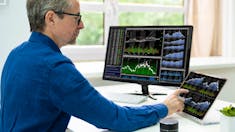Best 15 Stock Market Indices for Trading in 2024
All products and services featured are independently selected by WikiJob. When you register or purchase through links on this page, we may earn a commission.
A list of the Top Trading Brokers for April 2024:
A stock market index is a selection of stocks. They are used by analysts and traders to compare returns on share prices.
By tracking a selection of stocks, they can interpret the state of the economy.
Stock market indexes can also indicate the health of the stock market and provide greater business confidence which is vital for a well-functioning economy.
Simply put, if a stock market index (also known as stock market indices) is performing well, investors will continue to invest via pension funds, insurance, private equity, etc.
This drives up confidence in the stock market and boosts the economy. If there is no confidence in the stock market index, then investors will reclaim their money and invest elsewhere.
There are many different types of stock market indices; many of them you will likely have already heard of.
The three most common types are global, regional and national.
Later in this article, we’ll provide you with a brief overview of each one and explain what the best types of stock market indices are for trading.
Description of the Best Trading Brokers for April 2024
1. Plus500
Pros
- No buy/sell commissions and tight spreads
- Leverage of up to 1:30
- FREE unlimited Demo
- 2,800+ trading instruments
- Real-time quotes and advanced analytical tools
- Fast and reliable order execution
Cons
- No API integrations
- No social copy trading
Another user-friendly entry on our list of the best forex and CFD brokers in the UK is Plus500, providing an easy-to-use and accessible service.
You’ll find over 60 CFD currency pairs with competitive spreads, no commission and available leverage of up to 1:30.
Although MetaTrader and cTrader are not available, Plus500’s own platform is very user-friendly. It comes with a range of intuitive risk management features and is available on web and mobile.
Plus500 requires a minimum deposit of £100 if using a credit or debit card, and £500 if using bank transfer.
Plus500 UK Ltd authorized & regulated by the FCA (#509909).
2. eToro
Pros
- Regulated by FCA, ASIC
- No withdrawal fee for US clients
- 0% commission on stocks
- Social and copy trading
Cons
- Not available in every US State
- More expensive than most of its competitors
- No MetaTrader platforms
Below content does not apply to US users
Founded in 2007, eToro is considered a very low-risk broker as it is highly regulated by the Financial Conduct Authority (FCA) in the UK and many other regulatory bodies elsewhere.
Opening an account is free and you can access a $100,000 demo account to test the system.
It offers 47 currency pairs for trading. Spreads for forex trading have recently been significantly reduced and range from a very competitive 1 to 3 pips for major currency pairs.
Typical spreads for EURUSD and USDJPY trades, for example, are just 1 pip.
You can see the full list of spreads on the eToro website.
You’ll need to deposit a minimum of $200 for Copy Trading, eToro's standout feature which allows you to follow other traders and copy their trades.
This forex broker is great for beginners due to its user-friendly interface and app and 24-hour customer support. It allows you to trade currencies, stocks and cryptocurrencies in one portfolio and the Copy Trading system is a great way to learn.
The company also offers trading courses and features a Learning Lab which houses a variety of tools to support clients with their trading experience.
To find out more, read our eToro review.
76% of retail investor accounts lose money when trading CFDs with eToro. You should consider whether you understand how CFDs work, and whether you can afford to take the high risk of losing your money. Don’t invest unless you’re prepared to lose all the money you invest. This is a high-risk investment and you should not expect to be protected if something goes wrong. Take two mins to learn more.
3. AvaTrade
Pros
- Highly regulated
- Free deposit and withdrawal
- No commission
- Low minimum deposit
- Social and copy trading
Cons
- Not available for US clients
- Inactivity fees
AvaTrade offers traders the opportunity to trade on various stock market indices through Contracts for Difference (CFDs).
This allows traders to speculate on the price movements of entire stock indices without owning the actual shares of the companies within the index.
AvaTrade provides access to a wide range of global stock market indices. This typically includes major indices such as:
- The Dow Jones Industrial Average (DJIA)
- S&P 500
- NASDAQ (US)
- FTSE 100 (UK)
- DAX (Germany)
- CAC 40 (France)
- Nikkei 225 (Japan), among others
One of the significant advantages of trading indices with AvaTrade is the ability to trade on leverage. Leverage allows traders to open a larger position with a relatively small amount of capital. However, it's crucial to remember that while leverage can amplify profits, it also increases the potential for losses.
Trading indices through CFDs means you're speculating on the price changes of the index. You can take a position on whether you believe the index will rise or fall, offering opportunities to profit in both bullish and bearish markets.
Trading indices with AvaTrade can be done via their various trading platforms, including MetaTrader 4 and MetaTrader 5, as well as their proprietary mobile app, AvaTradeGo. These platforms offer advanced charting tools, live price feeds, and a range of analytical tools essential for trading.
AvaTrade is a regulated broker, which adds an extra layer of security to your trading activities.
Trading stock market indices with AvaTrade is a choice for those interested in the broader stock market performance, as opposed to individual stocks. However, as with all trading, it's important to be aware of the risks and to employ sound trading strategies and risk management practices.
4. IG
Pros
- Highly regulated
- MetaTrader 4 (MT4)
- Over 10,000 instruments
- Available in the UK and US
- 24/7 customer support
Cons
- High fees
- No deposit compensation scheme for US accounts
- No copy trading
- Inactivity fees
IG is a great share trading platform for beginners thanks to its user-friendly interface and extensive educational resources.
Pros of IG include a wide range of trading instruments and markets, as well as the ability to access multiple account types and trading platforms. The platform also offers a demo account for beginners to practise trading strategies before investing real money.
However, IG isn’t the cheapest share trading platform, with relatively high trading fees and a minimum deposit requirement of £250 when paying by credit/debit card or PayPal.
In terms of additional fees, IG charges a commission fee for share trading, starting from £8 per trade. There’s also a custody fee of 0.25% per year for holdings of £250 or more.
Overall, IG is a solid choice for beginners looking for a user-friendly platform with extensive educational resources, but investors should be aware of its fees and minimum deposit requirements.
5. Tickmill
Pros
- Low trading costs
- No minimum deposit for some accounts
- Variety of trading instruments
- Advanced trading platforms
Cons
- Limited product portfolio
- Inactivity fees
- Geographical restrictions
- Limited social trading features
Tickmill is a leading trading broker known for providing excellent trading services across various financial markets, including forex, commodities, and stock market indices. With its robust platform and comprehensive offerings, Tickmill caters to traders seeking diversified investment opportunities and reliable execution.
As a top trading broker, Tickmill offers competitive spreads, efficient trade execution, and a user-friendly interface, empowering traders to navigate the financial markets with confidence and ease. The platform's commitment to transparency and regulatory compliance ensures a secure trading environment for investors of all levels.
Tickmill's prowess extends beyond forex and commodities to encompass stock market indices, providing traders access to various index CFDs. These include major global indices such as the S&P 500, Dow Jones Industrial Average, FTSE 100, and DAX 30.
Traders can leverage Tickmill's platform to speculate on the price movements of stock market indices, allowing for strategic portfolio diversification and the exploration of various trading opportunities across international markets. With competitive pricing and flexible leverage options, Tickmill empowers traders to optimize their trading strategies and capitalize on market trends.
Tickmill is a top trading broker renowned for its comprehensive offerings and expertise across forex, commodities, and stock market indices.
6. Freedom24
Pros
- Access to 15 exchanges around the world
- Simple account opening
- Intuitive web trader and mobile app
Cons
- Withdrawal fee on each transaction
- High currency conversion fees
- No crypto or commodities
Freedom24 is a trading platform designed for stock market trading, offering access to 15 exchanges in Europe, the US and Asia. Registered in Europe by CySEC, Freedom24 is the European arm of Freedom Holding Corp., which is publicly traded on NASDAQ.
There are several different account types available, and the one you choose will depend on the currency you are more often going to be using – but all customers can make use of the initial 30 days of commission-free trading before choosing. Account and commission charges differ between accounts, but there are no inactivity fees and no minimum deposit to get started.
There is a €7 withdrawal fee, but you can choose to move your profit into a savings D-account instead and earn up to 5.8% interest instead.
There are plenty of research tools available, as well as a regular blog that contains updates, investment recommendations, and market analysis – from Freedom24 professionals, but also from other reputable organisations like JP Morgan and Merrill Lynch.
For those new to trading, there is a demo account available. Educational resources include an in-depth training course aimed at beginners called ‘Fundamentals of Investment’ and one for more experienced traders called ‘Options Trading’, which is particularly useful for those just getting started with stock options.
What Are the Top 15 Stock Market Indices for Trading?
Before we share details of the top 15 stock market indices for trading, you must understand the differences in stock market indices.
As we’ve already mentioned, stock market indices are a group of stocks taken from an exchange.
They may be based on a particular economy (for example, the FTSE 100 tracks the 100 largest companies on the London Stock Exchange, and the DJIA tracks the value of the 30 largest blue-chip companies in the US).
Or they could be based on specific sectors such as the Footsie which is based on financial companies.
Typically, stock market indices for trading are split into three distinct groups: global, regional and national.
Let’s break down the most popular stock indexes for each one.
Global Stock Market Indices
Global stock market indices comprise stocks from companies located around the world.
This is advantageous because it means that you are not reliant upon one specific economy.
Here are the major global stock market indices:
FTSE All-World Index
As a global stock market index, the FTSE All-World Index covers approximately 3,900 stocks from across 50 countries.
It’s inclusive of developed and emerging markets and is based on large and mid-sized companies from around the world.
It is believed that the FTSE All-World Index covers approximately 90-95% of the investable market capitalization.
S&P Global 1200 Index
The S&P Global 1200 has access to approximately 70% of the global market.
It covers 31 countries and comprises seven regional indices.
The S&P Global 1200 covers a wide range of sectors including financial, consumer, healthcare and IT.
Dow Jones Global Titans 50
This index monitors the performance of 50 blue-chip companies from around the world.
Each company is a global giant in its sector, whether that’s technology, healthcare, financing or consumer items.
To be part of the Dow Jones Global Titans 50, the companies must make a percentage of their profits from global markets.

Regional Stock Market Indices
Regional stock market indices are based on groups of stocks from specific geographical regions.
They can be used to see how different areas around the world may be performing – for example, Asia, Europe, or Latin America.
Here are the major regional stock market indices:
Try a Free Demo Account with eToro
76% of retail investor accounts lose money when trading CFDs with eToro. You should consider whether you understand how CFDs work, and whether you can afford to take the high risk of losing your money. Don’t invest unless you’re prepared to lose all the money you invest. This is a high-risk investment and you should not expect to be protected if something goes wrong. Take two mins to learn more.
S&P Asia 50 Index
This tracks 50 of the largest companies located in Asia, notably Hong Kong, South Korea, Singapore and Taiwan.
Notable firms included on this list include Samsung Electronics, Hyundai Motor Company and China Mobile.
Euro STOXX 50 Index
This Index looks at the top 50 blue-chip companies found within the Eurozone.
It was first launched in 1998 and is popular with investors who are keen to follow equity stock investments from across Europe.
Companies included within this index include LVMH Moët Hennessy Louis Vuitton, Siemens AG and L'Oréal SA.
S&P Latin America 40 Index
Tracking 40 Latin American blue-chip companies, the S&P Latin America 40 Index covers approximately 70% of the region.
It focuses on firms based in Brazil, Chile, Columbia and Peru.
National Stock Market Indices
As you may expect, national stock market indices are based on a selection of stocks from one specific country.
They are often a good indicator of the health of that country’s economy.
National stock market indices can also be used to track emerging markets where countries are experiencing a flourishing national economy.
Here are the major national stock market indices:
UK FTSE 100 Index
This tracks the 100 companies listed on the London Stock Exchange.
It features many globally recognized brand names, and it is one of the most popular exchanges in the UK due to the diverseness of the types of companies included within the index.
Investors are attracted to the FTSE 100 because the stocks are often international, allowing traders to benefit from global economies.
There is also good liquidity amongst the firms listed on the FTSE 100, and historically, there has often been a good return on investment.
US Dow Jones Industrial Average (US 30)
This is one of the world’s oldest stock market indices. It was launched in 1896.
The DJIA typically follows industrial companies listed on the US stock market which historically made up a significant part of the US economy.
As the DJIA only follows 30 companies, it’s not as influential as it once was. Instead, it’s been replaced by the S&P 500 which is a larger group of stocks.
However, it is still referred to by investors to compare the performance of the US economy over the past century.
Investors are attracted to this index because it’s been a reliable performer over the past decade.
Germany DAX Performance Index
The Deutscher Aktienindex is responsible for monitoring 30 of Germany’s leading companies listed on the Frankfurt Stock Exchange.
Due to its small size, it’s not indicative of the entire German economy but it does provide traders with an insight into three huge performers: SAP, Siemens and Linde.
Investors often consider the Dax 30 because of its liquidity. German companies are often heavily reliant on exporting and as such, the German stock indices are highly reliant on the global economy.
Canada S&P/TSX 60 Index
This index explores 60 companies listed on the Toronto Stock Exchange.
It features 60 companies, and investors are drawn to this because it offers cost-effective access to a large market share of the Canadian economy.
Companies listed on the TSX 60 include the Bank of Montreal, Shopify and Sun Life of Canada.
Try a Free Demo Account with eToro
76% of retail investor accounts lose money when trading CFDs with eToro. You should consider whether you understand how CFDs work, and whether you can afford to take the high risk of losing your money. Don’t invest unless you’re prepared to lose all the money you invest. This is a high-risk investment and you should not expect to be protected if something goes wrong. Take two mins to learn more.
France CAC 40 Index
The French CAC 40 is popular with overseas traders because it heavily relies on foreign earnings.
Monitoring 40 companies, including global corporations such as LVMH and AXA, the CAC 40 is considered one of the leading benchmarks of the French economy.
Investors are drawn to the index because it includes many consumer brands. The French economy has also proved to be resilient, with many of the brands listed expanding rapidly.
Italy FTSE MIB Index
The Italian Milano Italia Borsa (MIB) is a major European stock index.
It tracks the performance of 40 of the leading companies listed on the Borsa Italiana which is the national Italian stock exchange.
Like many other national stock market indices, it features a variety of globally-recognized brand names including Campari, Ferrari, Pirelli and Unipol.
India BSE SENSEX Index
Formerly known as the Bombay Stock Exchange (BSE), the S&P BSE SENSEX tracks the performance of 30 companies across a range of sectors.
As an emerging economy over the past 20 years, the performance of the S&P BSE SENSEX has seen enormous growth, recognizing the impact of companies based in India.
China SSE Composite Index
As a composite index, it’s made up of A Shares and B Shares listed on the Shanghai Stock Exchange.
It provides a good overview of the Chinese economy; however, it should be noted that it is notoriously unpredictable.
The Chinese Stock Market doesn’t have the same history as other stock markets (such as Wall Street or the London Stock Exchange) and the SSE Index has been impacted by many mistakes that have been made.
Japan Nikkei 225 Index
This is one of the most active stock markets in Asia.
The Nikkei 225 features 225 stocks listed on the Tokyo Stock Exchange.
Formed in 1950, it has a long history and investors are drawn to it because the companies listed have good liquidity and are commercially competitive around the world.
As an export-heavy country, the Japanese economy is reliant on a flourishing global economy.
Stock Market Indices Trading – Why Is It So Popular?
Many experienced investors choose to trade indices. This is where you can speculate on the trading price of stock market indices.
With just one singular position, you can have access to an entire sector or economy, depending on which stock market indices you choose to trade.
Typically, investments are made via spread betting or CFD trading.
You can choose to ‘go long’ – which is where you expect your investment price to rise. Or you can choose to ‘go short’ – which is where you are selling because you anticipate that the price will fall.
Your profit or loss is based on the accuracy of your prediction.
There are many reasons why someone may choose to commence stock market indices trading.
It’s a relatively reliable form of trading. This is because, unlike other trading options (such as forex or cryptocurrencies), you are not buying a share of a singular item.
This means that the financial position of that item cannot be manipulated.
Instead, you’re buying access to potentially hundreds of companies at once.
This means that there are far lower risks involved.
And risk management is the basis of all trading.
When you purchase a share in a singular company, your investment depends on the management of that company. If there’s an internal issue (perhaps they are being sued by someone, or maybe the C-suite executives are failing), then your share price could be adversely affected.
In contrast, with stock market indices trading, you are simultaneously trading on multiple companies (via entire sectors or economies).
This means that your trade is less impacted by the singular performance of one company.
With a stock market index, even if one company’s share prices fall, the price of the entire index could still rise.
This makes it far more secure for investors.
Stock market indices are statistical measures that track the performance of a group of stocks representing a particular market or sector.
These indices provide investors with a benchmark to measure the overall performance of the stock market or a particular segment of it.
They are used to gauge the health of the economy, assess the performance of investment portfolios and make investment decisions.
To read stock market indices, one needs to understand the components of the index and how they are weighted.
The value of the index is calculated based on the prices of the stocks that make up the index.
When the index goes up, it means the stock prices are increasing, and when it goes down, it means the stock prices are decreasing.
Investors can use stock market indices to track the performance of their investments and make informed decisions.
There are numerous stock market indices in the United States.
The most well-known include the Dow Jones Industrial Average (DJIA), the S&P 500, the NASDAQ Composite, the Russell 2000 and the Wilshire 5000 Total Market Index.
The major stock market indices in the United States are the Dow Jones Industrial Average (DJIA), the S&P 500 and the NASDAQ Composite.
The DJIA tracks 30 large, publicly traded companies, the S&P 500 tracks 500 of the largest companies in the US and the NASDAQ Composite tracks over 3,000 companies primarily in the technology sector.
Stock market indices can provide valuable insights into the performance of the stock market and the economy as a whole.
They can also help investors gauge the performance of their investment portfolios and make informed investment decisions.
By tracking the performance of stock market indices over time, investors can identify trends and patterns that can help them make better investment decisions.
Some of the most well-known European stock market indices include the FTSE 100 in the UK, the CAC 40 in France, the DAX in Germany and the Euro Stoxx 50, which covers 50 of the largest companies in the Eurozone.
Stock market indices tend to fall at the same time because many factors can affect the overall performance of the stock market.
Economic conditions, political events and investor sentiment can all influence the stock market, and when these factors are negative, they can cause a broad-based decline in stock prices across many sectors.
The best stock market indices depend on an investor's investment goals and risk tolerance.
Some investors may prefer the Dow Jones Industrial Average or the S&P 500, while others may prefer the NASDAQ Composite or the Russell 2000.
Ultimately, the best stock market indices are the ones that align with an investor's investment strategy and help them achieve their investment objectives.
Tracking stock market indices can provide investors with a benchmark to measure the performance of their investments, help identify trends and patterns, and make informed investment decisions.
By tracking the performance of stock market indices, investors can also gain insights into the overall health of the economy and assess the performance of different sectors and industries.
Stock market indices are calculated based on the prices of the stocks that make up the index.
The calculation method varies depending on the index, but generally involves weighting the stocks by market capitalization or price, and adjusting for changes in the composition of the index.
Stock market indices are often used as a barometer for the health of the economy and can provide insights into market trends. However, it is important to note that stock market indices are not perfect predictors of market trends or economic growth.
They are simply a reflection of the performance of the stocks that make up the index.
Many factors can affect the stock market, including economic conditions, political events and investor sentiment.
While stock market indices can be useful tools for investors, they should not be relied on as the sole predictor of market trends or economic growth.
The most common stock market indices in the world include the Dow Jones Industrial Average, the S&P 500, the NASDAQ Composite, the FTSE 100, the DAX and the Nikkei 225.
These indices are widely used by investors and provide a broad measure of the performance of the stock market in their respective countries or regions.
Final Thoughts
As you now know, there’s a lot to consider before choosing to trade stock market indices.
Although it’s a relatively reliable form of trading, it’s clear that there are a lot of different factors that could impact the performance of your trade.
With a choice of national, regional and global indices available, you need to weigh up the pros and cons of each and have a detailed understanding of global and regional economies before making a final decision.
Once you’ve chosen your preferred type, you should research before choosing which stock market index to trade.
We recommend taking a look at the history of each index. Many of them have decades of history and you can track their long-term performance, giving you greater insights into what to expect from peaks and troughs.
WikiJob does not provide tax, investment or financial services and advice. The information is being presented without consideration of the investment objectives, risk tolerance or financial circumstances of any specific investor and might not be suitable for all investors. Past performance is not indicative of future results. Investing involves risk including the possible loss of principal.












